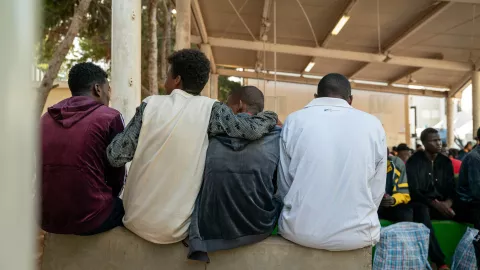“This is a common problem and it requires common solutions”
U-Reporter Bassirou Dembele, aged 20, shares vital information on COVID-19 with other refugees and migrants in Italy, and with family and friends in his home country of Mali

“It was one morning, I was at school, and my teacher asked us if we already heard about COVID-19. I said yes, I usually read news on my phone and, even if I didn’t know how dangerous this disease could be, I already heard in the past few days about what happened in Wuhan, China.
In a couple of weeks, the first cases had been registered in Italy and the virus started spreading very quickly. Finding out about COVID-19, I started to get scared and my concerns became more and more real when the Italian Government declared some northern regions as "red zones". Another blow was the closure of schools all across Italy. There was no longer a restricted "red zone", but the whole country became a protected area.
From this point my days changed a lot, and I found myself in a life I never imagined. Because almost all my activities have been blocked since the quarantine started in Sicily, it was very hard in the first two weeks, because I felt like a prisoner in my home. I had already moved from my country of origin, and my body and mind could not tolerate sitting there, waiting all day.
Now I study at home, but there are a lot of things I cannot do in this period. Sometimes I get stressed because I am worried about exams at school and the evolution of this situation. I no longer even have time to contact my friends via those apps allowing us to see each other virtually.
But I’m lucky. I am lucky because I live with a family and so, after this first period of stress, I realized there are people I can rely on. I started doing other kinds of things. I train at home with my brother Ivan. Also, we have a small cinema at home and after dinner we watch movies all together, and I'm starting playing the Bala which is an African musical instrument. But I miss my friends, my schoolmates, and a lot of simple things like returning at school, and walking on the streets of the city with friends.
As the virus continued to spread in other countries I started to consider the possibility to do something for the others. I started registering messages and sharing information on preventive measures and on the disease for other migrants and refugees who do not understand Italian very well, and I never forgot my loved ones in my country of origin.
For some of them I am now a reference point, so I started using Facebook live chats to explain them what COVID-19 is, how dangerous it can be, and the many fake news stories around it. And after all questions I was asked, I felt it was my duty to raise awareness about it. I started sharing information in Bambara for people in Mali to inform them about COVID-19.
Today, this is not a Chinese or an Italian problem. This is a common problem and it requires common solutions, and each one of us can provide support in one way or another (even by staying home).
I hope that this period of emergency will help all of us to reflect on the sustainability of our behaviours and ways of living and that even after this emergency we will take care of the environment with concrete actions, and of the communities in which we live. This virus does not look at the colour of skin or religion, it’s a common problem and we need to act as one.”
UNICEF works with adolescents and young people across the Europe and Central Asia Region, with a strong focus on those from marginalized groups, including refugees and migrants. We are using innovative approaches to amplify the voices of young people like Bassirou Dembele through U-Report on the Move, and unleash their entrepreneurial skills to benefit their host communities through UPSHIFT.
UNICEF is expanding this work in response to the COVID-19 pandemic, striving to stop the spread of the disease and protect the most vulnerable against its impact by building on effective initiatives that are already in place. We are appealing for $38 million for the Europe and Central Asia Region to support this expansion as part of UNICEF’s Global Humanitarian Action for Children (HAC) for COVID-19 response.





